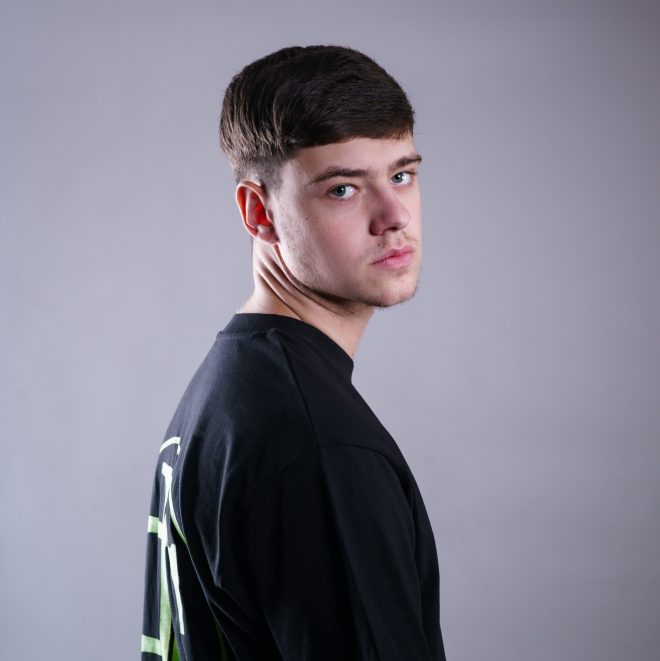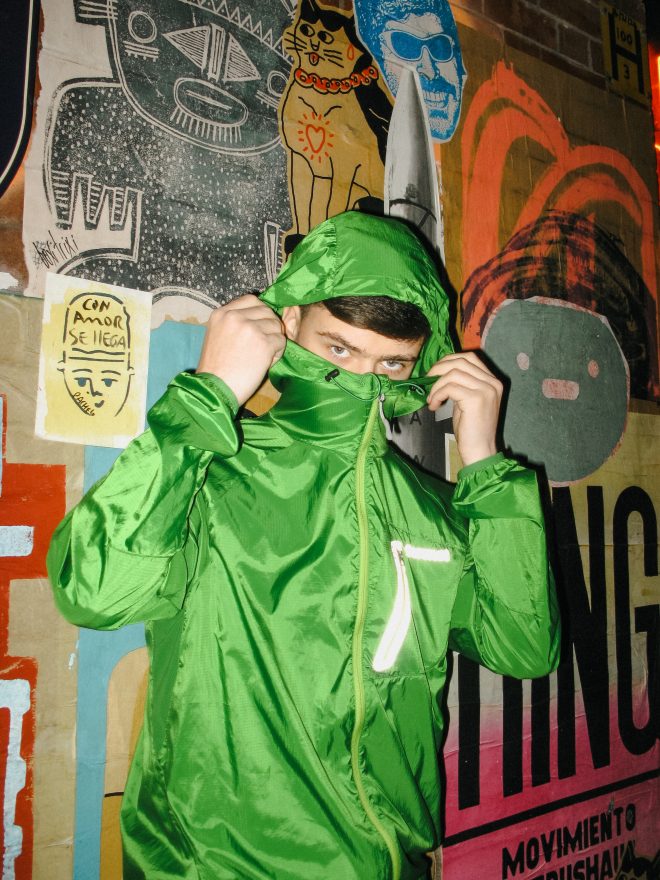Alex Farell: No Age Limit

At just 18, Alex Farell has already lived through milestones most DJs dream of chasing for decades. From producing tracks on a laptop at twelve years old to closing Parklife Festival with Teletech, his rise is both surreal and symbolic of a new generation rewriting the rules of hard techno. For him, music has never been a hobby or a plan B. It has always been the only way forward.
This is the story of a kid who sacrificed school revision for studio time, who sent Soundcloud messages to his heroes and now shares studios and stages with them, who has become both a symbol and a role model in a scene where age truly does not matter.
Early obsession and origins
“Ever since I was born, I’ve always loved music. When I was around 7 or 8, I remember I’d save up my pocket money to buy new music on iTunes so I could listen on my iPod. I think I mainly caught the music bug from my dad; he loves music too, and he has always had it playing in the house. He was also a bit of a raver back in the day. When I first discovered that it was possible to produce music on just a laptop, I was excited to get started and quickly became completely lost in Ableton. The idea of being able to make my own techno music was so crazy to me, I just completely fell in love with it.”
“It’s funny listening back to old tracks, it feels very nostalgic to be honest, and I enjoy going back now and then. Back then, there was no pressure, and I was making music purely for myself, which is pretty difficult to do now in this scene.”
By 14, he was no longer locked away in his room but playing clubs, legally chaperoned, introducing the energy of hard techno to packed rooms while still technically a kid in school.
“It was really cool to be honest, I remember doing my first gig in the WAV in Liverpool. My dad came with me and stood behind me while I played. Even though I was opening and only around 50 people were there, it was probably the biggest buzz I’d ever felt in my life. From that moment, I knew that I had to work as hard as I could to make this my full-time job.”
Breakthrough tracks and recognition
The real breakthrough came with 3AM in Berlin, a track that spread like wildfire across the hard techno scene.
“I remember I was on holiday with my family when DYEN replied to my Soundcloud message saying, ‘amazing track bro, will play this tonight.’ When I woke up, I went straight to his Instagram story and saw that he opened his set with my track. The roar from the crowd was absolutely insane. This was the point that maybe I was onto something.”
From that moment, his confidence shifted.
“Once 3AM in Berlin was released, I felt so motivated to take my sound to the next level. It made me realise that really anything is possible. From working in my bedroom to having my tracks played in front of thousands, it was a crazy feeling.”
That same hunger powered the Jungle Boy EP, a record written in libraries, between classes, and in the stolen hours of school life.
“I think the fact that I wasn’t meant to be producing music at the time gave me a lot of motivation. At this point, I was working really hard because I could feel that my tracks were getting really strong and all the big DJs were playing them.”
“I think when I was in school, I was so motivated to make DJing a full-time job that I pretty much sacrificed my education for it. I would skip revision lessons just to finish off my tracks. Which I have no regrets about either, as they are the tracks that blew me up in 2023.”

The scene and his place in it
By now, Alex is no longer the kid sending Soundcloud DMs. He is in the studio with his heroes and sharing stages with the DJs he once watched online.
“It feels very surreal, luckily all of the DJs I know are really nice people and we get on really well. I never really get star-struck, but it does feel surreal looking back when I’m in the studio with big artists like Sara Landry. I remember being in class in school watching her live streams, hoping she would play my track, and now to be in the studio making bangers with her is surreal.”
The rise of hard techno, especially in Liverpool and Manchester, has been rapid, and Alex is conscious of his role in it.
“I want to see myself as a role model for all young DJs who have a passion for music. It’s powerful to see a young lad like me doing the shows I do. It proves that in the techno scene, age does not matter. I really caught the hard techno wave at the right time. The scene is so fast-paced now that it feels like trends come and go every few months. From the 2 years I’ve been touring, I’ve seen the style of tracks that everybody plays completely shift into a lot harder style.”
“I think nowadays hard dance or hard techno is such a broad term that it incorporates all kinds of music. I think my generation is the first to break the rule book in terms of production. Signing to labels is becoming a thing of the past, and lots of people are now just self-releasing, and it is working really well for most artists.”
Live shows and highlights
Boiler Room at 16. Closing Parklife for Teletech. And still, he points to a Liverpool warehouse as his defining moment.
“The moment that I feel really put me on the map was my Blackstone warehouse show last year supporting Azyr. I played for two and a half hours, and I remember I played a lot harder than I usually do. The feedback was so amazing that I’ve been fortunate enough to host my own invite show this October. I want to be able to represent Liverpool for the hard dance genre, as this city is thriving with talent.”
Even with milestones stacking up, he still carries the label of being “the kid” in green rooms.
“I’m always kind of known as the kid in the green rooms, as everyone knows me as being really young. However, as I’ve toured for almost 2 years now, I’ve become good friends with most DJs in the scene, so I’d say I’m a bit more of a peer now to everyone.”
Preparation, for him, is all about instinct.
“I’ve always been very confident behind the decks ever since I was very young. I never really get nervous for big gigs, I just feel really excited. I don’t plan any of my sets; I like just to wing it, as it adds a bit more of a challenge on my end to read the room.”
The future and philosophy
For Alex, there has never been a plan B. Music is the path, the passion, the therapy.
“I’m very blessed and very thankful to be able to do something that I love as a job. I truly believe that if you put your mind to something and work really hard at it, good things will come over time. As long as you’re in it for the right reasons.”
“I don’t really feel any pressure that I don’t have a plan B. I’ve been able to make a good amount of money from producing music since I was 14 through various means, including ghost producing, mixing and mastering, and of course releasing my own tracks. If I stopped touring today, I’d be pretty comfortable using my production skills to help others out with their music.”
And for the next generation hiding away in their bedrooms, afraid their music is not good enough yet, his message is clear.
“The most important thing I can teach the younger generation is that hard work really does pay off. Producing music is a tough skill to learn, but once you learn and train your ears, the possibilities are endless. I think music production can be used as a form of therapy to release your emotions. When you’re in full flow state, that’s when the best work comes out.”
“I think I would just say to my 12-year-old self, keep working hard. All the work that you will put in will be worth it in the future because you will get to live your dream.”
Alex Farell’s rise is the kind of story that captures the imagination. From teaching himself to produce at twelve to commanding festival stages before turning twenty, his path is fueled by discipline, hunger, and a refusal to treat music as anything less than a life’s work. What began as a secret obsession in his bedroom has become a full-time career built on determination and instinct.
He has shown that age does not matter when the music connects, and that breaking the old rulebook is not a risk but a necessity. His sets carry the intensity of someone who still has everything to prove, yet his confidence behind the decks shows he already belongs.
More than achievements or co-signs, what defines him is belief: belief in hard work, in honesty, and in music as therapy. That conviction has taken him from Liverpool classrooms to the heart of Europe’s hardest dancefloors, and it is only the beginning. Alex Farell is not just arriving on the scene; he is reshaping it in real time.


